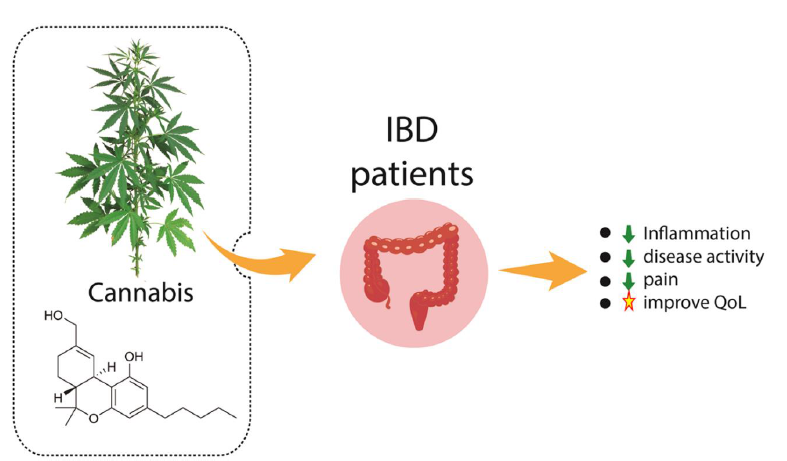How Effective Is Cannabis for Ulcerative Colitis?
Ulcerative colitis is a chronic inflammatory bowel disease (IBD) that causes inflammation in the lining of the colon and rectum. This long-term condition can lead to a variety of symptoms, including diarrhoea, rectal bleeding, abdominal pain, and discomfort. The severity of these symptoms can fluctuate, making daily life challenging for those affected.

Symptoms of Ulcerative Colitis
Ulcerative colitis is associated with several common symptoms, including diarrhoea, bleeding from the rectum, abdominal cramps, fatigue, and weight loss. More severe symptoms can include joint pain, anaemia, and malnutrition. These symptoms can have a significant impact on an individual’s quality of life, causing frequent trips to the toilet, physical discomfort, and emotional strain, which can interfere with work, social activities, and overall well-being.
How Cannabis Might Help Ease Symptoms of Ulcerative Colitis
Research suggests that cannabis may offer anti-inflammatory effects, potentially reducing inflammation in the colon and rectum. This could help to relieve common symptoms such as diarrhoea, abdominal pain, and bleeding. Cannabis is also thought to affect the body’s perception of pain, which may help reduce the discomfort and cramping often experienced by those living with ulcerative colitis.
The Endocannabinoid System
The endocannabinoid system (ECS) is responsible for regulating several key bodily functions, including inflammation, pain sensation, and digestive health. It is made up of endocannabinoids, cannabinoid receptors (CB1 and CB2), and enzymes that break down cannabinoids.
Cannabis contains phytocannabinoids, which are similar to the endocannabinoids produced naturally by the body. These phytocannabinoids, such as THC and CBD, interact with the CB1 and CB2 receptors within the gut. By doing so, they may help reduce inflammation, alleviate pain, and improve digestive function, potentially offering relief from ulcerative colitis symptoms.
The Role of Cannabis in Managing Ulcerative Colitis
Several studies have examined the effectiveness of cannabis in treating inflammatory bowel diseases, including ulcerative colitis. A review of literature by Basil N. Nduma and colleagues in 2023 highlighted the efficacy of cannabinoid use in IBD treatment, noting that most studies reported positive outcomes and only minimal side effects.
In another study, Tim Ambrose and Alison Simmons found evidence that stimulating the CB1 and CB2 receptors had anti-inflammatory potential in the intestines, indicating cannabis could reduce inflammation in those with ulcerative colitis.
Additionally, a report by Tahir S. Kafil noted that animal and laboratory models showed cannabis and cannabinoids reduced inflammation, suggesting they may help those living with ulcerative colitis. However, further research is recommended to confirm these findings in human subjects.
Ways to Administer Cannabis for Ulcerative Colitis
There are three primary methods of using cannabis to manage ulcerative colitis symptoms: inhalation, ingestion, and topical application.
-
Inhalation: Vaporising cannabis is a popular option, as it allows cannabinoids to be absorbed through the lungs, providing quick relief. Vaping is often preferred over smoking due to fewer associated health risks.
-
Ingestion: Cannabis tinctures can be taken sublingually (under the tongue) for fast absorption, bypassing the digestive system. Edibles, on the other hand, are absorbed through the digestive system, providing longer-lasting relief but with a slower onset of effects.
-
Topical Application: While not as common for treating ulcerative colitis, topical cannabis products may be useful for joint pain in those experiencing severe symptoms.
Cannabis and Standard Treatments for Ulcerative Colitis
Traditional treatments for ulcerative colitis often include anti-inflammatory drugs, immune suppressants, and other symptom-specific medications. These treatments aim to reduce inflammation and manage symptoms, but they may not always be fully effective. In some cases, cannabis may provide additional relief when used alongside conventional therapies. By targeting different pathways in the body, cannabis could complement standard treatments, potentially reducing inflammation, relieving pain, and improving appetite.
However, it’s important to recognise the possible side effects of cannabis use, which can include drowsiness, dry mouth, and changes in appetite. Additionally, cannabis may interact with other prescription medications, so it is essential to consult a doctor before starting any cannabis-based treatment.
Legal Considerations
In the UK, the legal use of cannabis for medicinal purposes was introduced in November 2018. Specialist doctors are allowed to prescribe cannabis-based products to patients with certain conditions, including ulcerative colitis, but access to these treatments can be limited. Not all patients with ulcerative colitis will be eligible for a prescription, and the treatment may not be covered by the NHS.
Doctors will evaluate each patient on a case-by-case basis, considering medical history and the severity of the condition before prescribing medicinal cannabis. Patients should view cannabis as one of several treatment options available, rather than a guaranteed solution.
